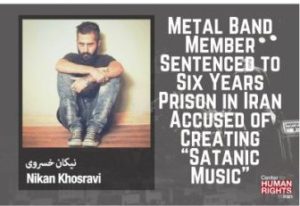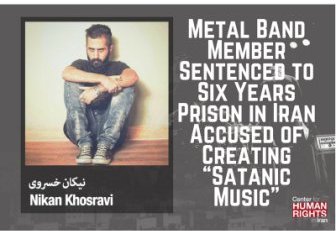Nikan Khosravi, a member of the Iranian metal band “Confess,” fled Iran last March to find safety in Turkey in an effort to avoid being imprisoned for six years for producing “satanic” music.
On March 29, 2018, Khosravi told the Center for Human Rights in Iran (CHRI) that “the interrogators had translated my English lyrics [into Farsi] verse by verse and were asking questions about this and that word and told me I was a Satan worshipper and didn’t believe in God.”
“They really thought I was a bad person. They asked about who was giving me financial support and what were my connections,” he said.
“They said my lyrics were political, but I was 21 and wasn’t interested in and didn’t understand politics. But when you live in Iran, from the day you are born, politics get mixed into your daily life and that’s why it entered my lyrics,” he added.
Khosravi and fellow band member Arash Ilkhani were arrested by the Islamic Revolutionary Guard Corps (IRGC) in Tehran on November 9, 2015, shortly after they released their second album, titled “In Pursuit of Dreams.” They were arrested for allegedly producing “satanic” music.
“Seven or eight agents suddenly raided our home and started searching everywhere, including my room. They confiscated some of my belongings and then handcuffed me and took me with them,” Khosravi said.
“They [the guard corps] told me I was accused of insulting the prophet. They also arrested Arash [Ilkhani] on the street on his way home from the university. We were interrogated separately by the IRGC for 10 days in Ward 2-A in Evin Prison. I was interrogated by four or five agents,” Khosravi told CHRI.
“For a long time I thought I was going to be executed, but with the help of my lawyer, the interrogators accepted that my lyrics did not contain anything insulting toward the prophet or his disciples. I just had one song that was about the nature of God,” he noted.
All artists in Iran, including painters, filmmakers, photographers and writers, have to get approval from Iran’s Ministry of Culture and Islamic Guidance if they want to publicize their work in the country. Anyone who promotes or publishes their work without receiving a permit can be arrested and jailed
On March 17, 2017, Khosravi and Ilkhani were sentenced to six years in prison each for “insulting the sacred” and “propaganda against the state” by Judge Mohammad Moghiseh of the Revolutionary Court in Tehran.
Although Ilkhani opted to stay in Iran to wait for the final appeals court’s ruling, Khosravi fled the country after the preliminary verdict on March 17, 2017. He sought asylum in Turkey through the United Nations’ high commissioner for refugees.
“I’m 24 years old. I have been living with fear and anxiety since our arrest,” Khosravi told CHRI. “After the court issued its verdict, I realized that I could go to prison for six years, or maybe a little less if the sentence got reduced on appeal, so I decided to leave Iran.”


